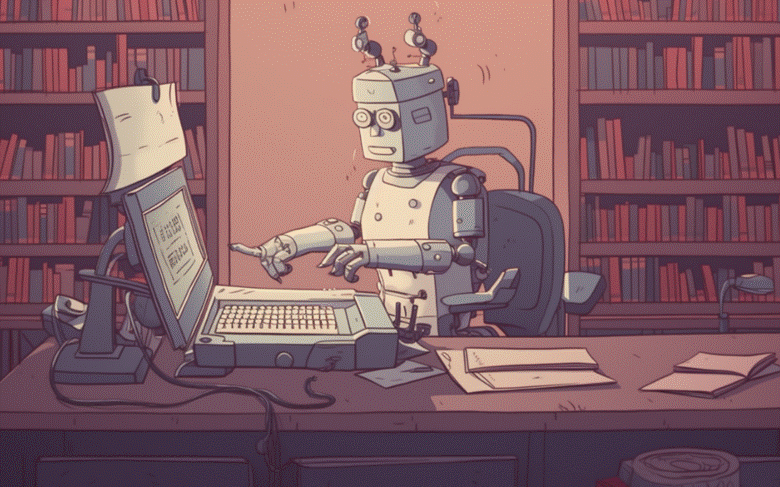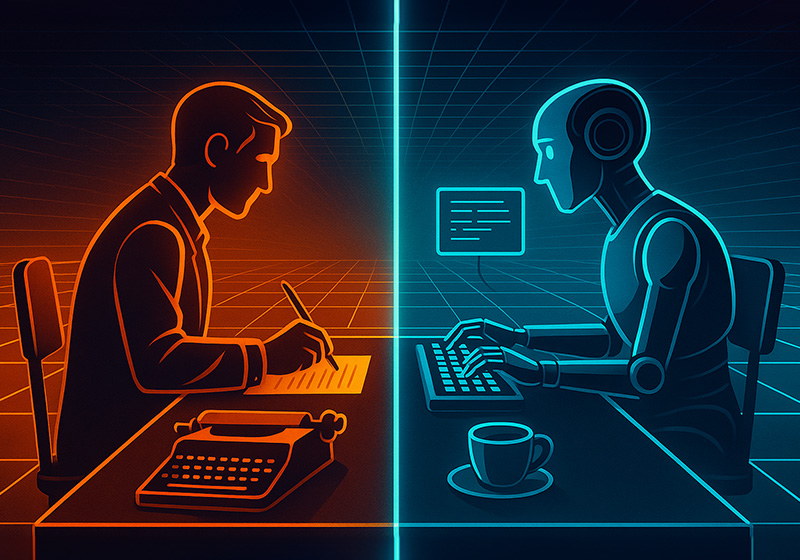Table of Contents
In January 2025, the Authors Guild, America’s oldest and largest professional organisation for writers, made an unprecedented move: it started certifying books written by humans. In what would once have been the stuff of science fiction, the Guild is now putting the label ‘Human Authored’ on titles produced without the use of artificial intelligence (AI).

How does Human Authored certification work?
At the moment, Human Authored certification is only available for members of the Authors Guild: so to get a label, you must first join the Guild and then submit your book for certification. But the Guild is planning to open the service to non-members, too, in the American market at least, who will have to pay around ten dollars per book for the privilege.
The label is self-certified: while the Guild mentions (vague) fraud detection processes, certification essentially relies on the honesty system, with writers themselves declaring whether they’ve used AI tools to produce a book and how. ‘De minimis’ use of AI is allowed: tools like ChatGPT can be used for brainstorming, correcting drafts and other editing tasks.
But where exactly does the Guild draw the line on the use of AI? According to its rules, a book can’t be certified Human Authored if the work performed by AI is such that, if it had been done by a human, they would have a claim for copyright.
It’s clearly a thorny issue that raises lots of questions. And the Guild’s scheme is just on of many being hastily launched as the publishing world grapples with this period of profound technological change. For some years now, people have been using generative AI to write all kinds of books – from novels and children’s books to how-to guides and recipe books – many of which have been written and published in a matter of hours.
While the literary output of ChatGPT and the like may seem a pale imitation of human-authored books, this technology is nonetheless changing the publishing world. And it’s raising profound questions about everything from the meaning of creativity to the business model for publishers and authors.
How does an AI write a book?
It’s time to take a closer look at how generative AI tools – ChatGPT, Gemini, Copilot and others – are being used to do work that until recently was performed exclusively by humans: writing.
AI-powered chatbots are capable of producing complex and ‘creative’ texts: all they need is input from a human – a prompt. According to Sam Altman, CEO of OpenAI – the company behind ChatGPT – the next ChatGPT models will be especially good at creative writing.

Whether or not you believe Sam Altman (who’s by no means impartial), it’s certainly true that AI is creeping into everyday work, including that of writers. These tools are increasingly being used for tasks like correcting drafts, brainstorming and outlining – all uses allowed under the Human Authored certification scheme.
What are AI-generated books?
Some authors – and some publishers – have gone all in on literature written using ChatGPT or other AI tools. In just a few hours, with just a few simple prompts, it’s possible to produce and publish a book with the bare minimum of human input. That’s exactly how Kamil Banc wrote his children’s book. He gave ChatGPT the prompt “write a bedtime story about a pink dolphin that teaches children how to be honest” and within hours had a 27-page book for sale on Amazon.

Highly automated self-publishing services like Amazon Kindle Direct Publishing now let you publish and sell books on the world’s biggest e-commerce platform in minutes.
This speed and ease has attracted thousands of new authors who, using generative AI tools, have flooded online stores with books that, shall we say, lack the human touch.
The first books written by AI
Before they inundated online stores with dull content with scant literary merit, AI books were an area of artistic and technological experimentation. Back in 2017, we saw the bizarre 1 the Road, a sort of remake of Jack Kerouac’s cult classic On the Road [whose incredible covers we talked about here]. 1 the Road was written by a computer based on data captured by its sensors as it was driven along the route described in the original novel.

A couple of years later, in 2019, another book entirely written by AI was released, this time by academic publishing giant Springer. It’s fair to say the book wasn’t the most scintillating read: it was a bone-dry summary of over 50,000 scientific papers on lithium-ion batteries.
Following the release of ChatGPT in 2022, a wave of AI-authored children’s books hit e-book stores. Literary merit aside, sales for these titles were largely disappointing, with most selling only a few dozen copies at best.
Human writers vs. AI authors?
Though many authors don’t currently see AI models replacing them completely, some are starting to worry. What scares them most is tons of AI-generated books being dumped on the market, creating confusion in readers between what’s a high-quality human-authored book and what’s simply AI slop.
At the moment, there’s no doubt that great authors are still writing far more compelling books than any AI tools.

In the summer of 2024, The New York Times conducted an amusing experiment: it published two ‘beach reads’, one written by best-selling author Curtis Sittenfeld, the other by ChatGPT. The paper then asked readers to guess which story had been written by a living, breathing human.
It was no contest: the vast majority of readers correctly identified Sittenfeld’s as the human-written piece. But if the stunt were repeated in five years’ time? It might well be a different story…
What do you think about books written by AI? Still prefer to read the work of humans? Or are you curious about the new possibilities this technology holds for publishing?

